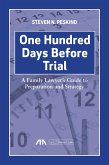"This book provides practical tips for family law attorneys, from investigating allegations of parental alienation and domestic violence to admitting expert testimony to aid the court in its fact-finding. Still, the main focus is the law, examining the contexts in which this issue comes up, how courts address the subject across the states and worldwide, the role of a Guardian ad Litem, and the legal interventions available to courts. It is a resource that will make practitioners and court professionals better."
-- Bridget Mary McCormack, Michigan Supreme Court Chief Justice
"Joshi focuses on one of the most important issues that our legal system confronts: the rights of children. More broadly, he informs and guides trial lawyers whose cases involve emotion-laden issues, and the need for science-based evidence. That's pretty much all of us."-- Michael E. Tigar, Former ABA Litigation Section Chair
Litigating Parental Alienation provides an in-depth examination of evaluating a case of parental alienation and practical guidance for handling a case in court. An overwhelming number of American family courts have acknowledged that parental alienation exists, although there is significant variance in how the courts have defined it and how they deal with it. As these cases involve not just family law practitioners, this book offers science, case law, and practice pointers for Guardians ad Litem, family court judges, referees, minors' counsel, and custody evaluators.
The first chapter provides both a brief history and overview of the controversies surrounding the phenomenon of parental alienation, providing a starting point for a fundamental understanding of the concept. Author Ashish Joshi distills his experience of litigating parental alienation cases before family courts all over America and internationally. He discusses not just the concepts but also offers "hands on" practice pointers with supporting case law in presenting cases of parental alienation in family courts. The book also discusses the criteria for the admissibility of expert testimony on parental alienation, how to present the expert evidence, as well as a state map of admissibility standards. Finally, the author debunks the commonly-held myths and fallacies that compromise judicial outcomes in parental alienation cases.
Chapters address these critical issues in litigating parental alienation cases:
-- Bridget Mary McCormack, Michigan Supreme Court Chief Justice
"Joshi focuses on one of the most important issues that our legal system confronts: the rights of children. More broadly, he informs and guides trial lawyers whose cases involve emotion-laden issues, and the need for science-based evidence. That's pretty much all of us."-- Michael E. Tigar, Former ABA Litigation Section Chair
Litigating Parental Alienation provides an in-depth examination of evaluating a case of parental alienation and practical guidance for handling a case in court. An overwhelming number of American family courts have acknowledged that parental alienation exists, although there is significant variance in how the courts have defined it and how they deal with it. As these cases involve not just family law practitioners, this book offers science, case law, and practice pointers for Guardians ad Litem, family court judges, referees, minors' counsel, and custody evaluators.
The first chapter provides both a brief history and overview of the controversies surrounding the phenomenon of parental alienation, providing a starting point for a fundamental understanding of the concept. Author Ashish Joshi distills his experience of litigating parental alienation cases before family courts all over America and internationally. He discusses not just the concepts but also offers "hands on" practice pointers with supporting case law in presenting cases of parental alienation in family courts. The book also discusses the criteria for the admissibility of expert testimony on parental alienation, how to present the expert evidence, as well as a state map of admissibility standards. Finally, the author debunks the commonly-held myths and fallacies that compromise judicial outcomes in parental alienation cases.
Chapters address these critical issues in litigating parental alienation cases:
- Court interventions
- Expert testimony and presenting a case
- The role of guardian ad litem and child representative
- Misinformation about parental alienation and how to respond to it
- Domestic violence and parental alienation
- Defending against false allegations of parental alienation
- Tips and guidance for practitioners
- Appendices, including cases documenting alienating strategies and signs of alienation in children, state admissibility standards, and statutes and cases regarding minors' counsel
Dieser Download kann aus rechtlichen Gründen nur mit Rechnungsadresse in A, D ausgeliefert werden.









